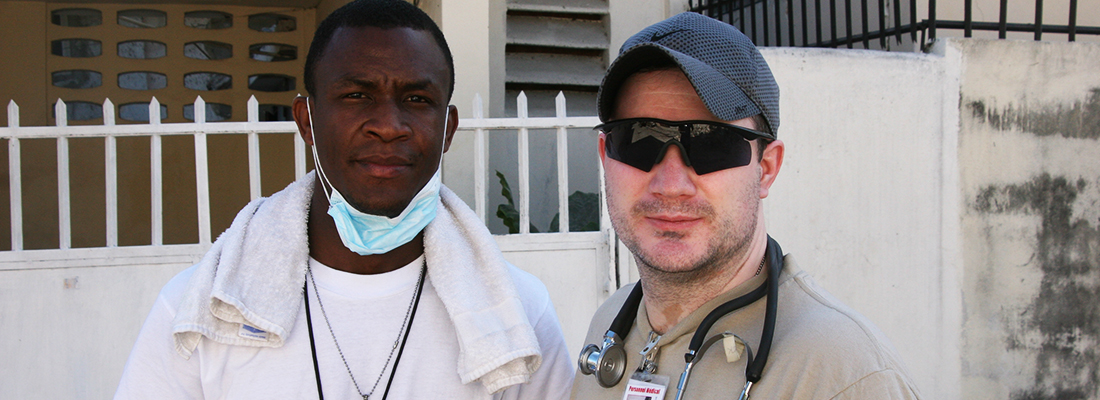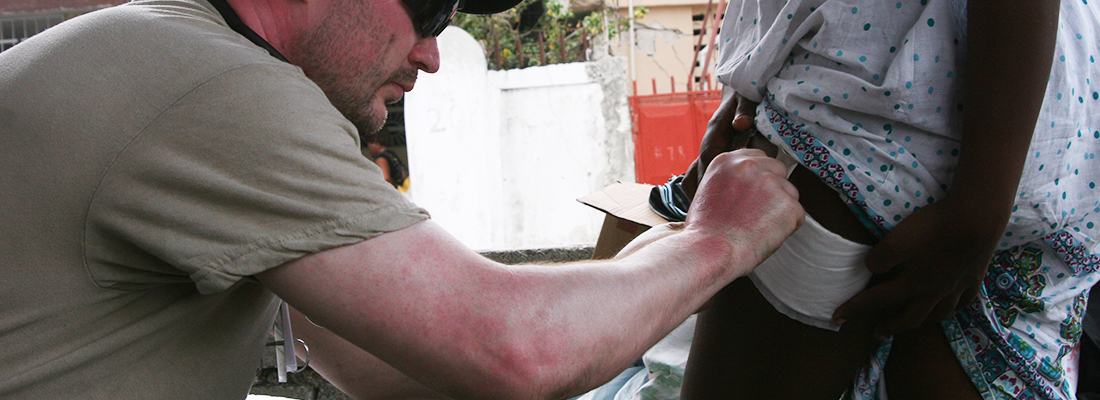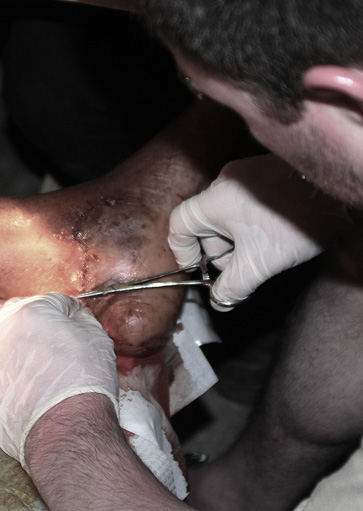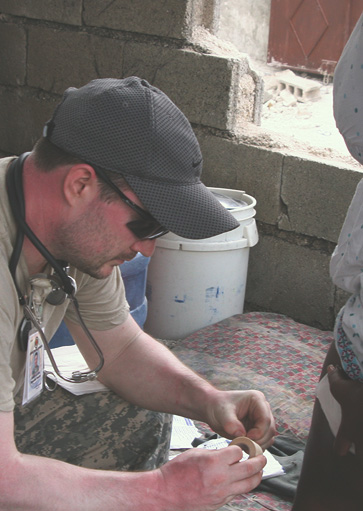RAMP Program
The Remote and Austere Medical Practitioner (RAMP) is a unique hybrid medic, whose baseline knowledge and skill sets begin with meeting the cognitive and psychomotor requirements for certification as an entry-level medic, and then progressively expands to focus on a myriad of both medical and trauma management problems that are typically well above the scope of practice of many other prehospital care providers.

 A Unique Program for Exceptional Medics
A Unique Program for Exceptional Medics
As there is no universally accepted certification process that authorizes the procedures, skills, and degree of autonomy required by medics who provide treatment in remote and austere conditions matching our mission and operational remit, Boots on the Ground (BOTG) began developing a Competence and Curriculum framework in 2010 suitable for real-world needs called the Remote and Austere Medical Practitioner (RAMP).
RAMPs are what we consider to be a new and exciting breed of medical professional who, while not doctors, work to the medical model. The RAMP pipeline combines elements of the United States Special Operations Command’s (USSOCOM) Advanced Tactical Practitioner (ATP) program with that of other allopathic medical models (such as the Physician Associate, Surgical Care Practitioner, and Surgical First Assistant) to produce medics that have the knowledge, skills, and experience needed to provide the highest level of emergency, extended, and primary medical care required after natural or man-made disasters, in developing nations, and in regions torn by conflict.
Because RAMPs can be needed virtually any place on the planet, regardless of the season, time of year, or given weather conditions, they must be multifaceted. We know that the survival rate of trauma victims, for example, depends largely on the close proximity and timing of a patient receiving definitive care. Moving a critically injured patient to a hospital, particularly in high-risk or remote areas, is often impractical or impossible. Accordingly, RAMPs are well trained and equipped to treat a variety of medical emergencies to include those commonly found in combat zones, harsh desert and wilderness, and other settings where communities and tribes generally have no heath care providers to assist when people become sick and injured.
Combined with very limited resources, RAMPs must be able to think both inside and outside of the typical medical box, and work to solve complex medical problems while taking into consideration the unique operational environment they may be in. RAMPs maintain significant certifications such as prehospital trauma life support (PHTLS), advanced cardiac life support (ACLS), and pediatric education for prehospital professionals (PEPP), all of which are provided in the pipeline either as initial certifications or re-certifications for candidates.
The training pathways that RAMPs engage in are broad, deep, and very controlled. Once certified, RAMPs are capable of treating patients in all environmental extremes, and have the ability and knowledge to practice preventive medicine, dispense and administer medications, perform multiple complex procedures, and provide lifesaving care to those in need where doctors or other senior medical professionals are otherwise unavailable.
Training & Certifications Provided
RAMP candidates run through an intensive training pipeline designed to bring individuals from different backgrounds and at varying levels of expertise to a single point of base competency expected of any certified RAMP by our organization. Training is incredibly intense, demanding, and highly academic in nature.
Candidates study a variety of foundational and advanced courses including, but not limited to, organic and inorganic chemistry, anatomy and physiology, pathophysiology, microbiology, pharmacology and pharmacotherapeutics, parasitology, and virology, clinical problem solving, differential diagnosis, advance clinical care, pre-hospital trauma emergencies, advanced trauma skills, surgical procedures, obstetrics and pediatric emergencies, cardiac pharmacology, training in combat trauma management, PEPP, and many others. Cultural training, sociology, and elementary French and Spanish are also required.
Professional certification include, but are not limited to, Basic Life Support (BLS), Advanced Cardiac Life Support (ACLS), Pediatric Life Support (PALS), International Trauma Life Support (ITLS) – Prehospital Trauma Life Support (PHTLS) bridge at the basic, intermediate, and advanced levels, basic Search and Rescue Technician (SARTECH), Wilderness Emergency Medical Technician (EMT-W) add on, Tactical Combat Casualty Care (TCCC), Geriatric Education for Emergency Responders (GEMS), and others.
Once RAMP academic components are completed, candidates move on to complete a clinical rotation and field internship abroad in South America, Haiti, or Africa. In some instances, candidates are provided opportunities to gain further certifications and training in areas well beyond the core RAMP curriculum, which are already significant, such as intermediate and advanced search and rescue techniques, close-protection, tactical driving, rescue and recovery diver (scuba), alternative deployment operations, team protection, protective intelligence, conflict resolution and peace operations, and others.
Different RAMP Levels
Fully certified and registered RAMPs have progressed through a strict regimen of academic and hands-on training, and hold multiple component and ancillary certifications. Each RAMP level identifies the abilities and limitations of the holder with the context of our Competence and Curriculum framework and standard operating procedures.
RAMP-Recruit is a non-certified entry-level position for individuals accepted into our RAMP training program. All candidates must be 18 years or older, and most have already completed an EMT course, or are currently enrolled.
RAMP 1 is the basic entry certification level required by BOTG to provide support to our DMATs or medical programs on deployments. A RAMP 1 will have successfully passed the rigorous requirements of RAMP 1 training.
RAMP 2 is the intermediate certification level required by BOTG to act as assistant team leaders. A RAMP 2 will have significant pre-hospital care training and experience, will have assisted with the planning and participated in operational deployments, will have considerable leadership training and demonstrated leadership ability, and will have successfully passed the rigorous requirements of the RAMP 2 training.
RAMP 3 is the advanced certification level required by BOTG for autonomous deployments and/or to act as a team leader. A RAMP 3 will have significant additional extended care training and experience, advanced leadership training, will have planned and led operational deployments, some teaching and mentoring experience, and will have successfully passed the rigorous requirements of the RAMP 3 training.
RAMP 4 is our senior designation in the certification spectrum. A RAMP 4 will have an inordinate amount of pre-hospital, primary, extended care, and specialty training and experience, advanced academic and personal development training, will have planned and led numerous operational deployments to multiple countries in a variety of environments, will have considerable teaching and mentoring experience along with an exceptional service record, and will have successfully passed the rigorous requirements of the RAMP 4 training. Consequently, RAMP 4s will generally hold inherent strategic, administrative, operational, and positional authority within the organization.
There are also RAMP ranks that are positional in nature, and are based on leadership ability, experience, speciality, cadre status, and functionality within the organization.

How can I become a RAMP?
There are several different paths new applicants take to become BOTG certified RAMPs. Each applicant is evaluated during an extensive process, and no previous or existing medical certification automatically entitles a new volunteer to advanced placement or deployability status with us. Only in select cases does a current medical certification or license allow for lateral transfer, and normally only into a training phase. Since the program is extremely academically rigorous, applicants should not take the decision to apply lightly.
All RAMP applicants must pass a background investigation, oral board and/or interviews, physical and written examination regardless of service, previous education, current medical certification level, deployment experience, or background before they are officially accepted as a recruit. And only after passing all initial requirements does a recruit become a candidate for RAMP certification.
Please read the following explanations to identify which best describes your current circumstance. If you require further information, feel free to get in touch with us using the contact page, or complete our volunteer application for consideration.
The most complete applications receive priority status.
Current (or recently separated) SOF Medics:
Those individuals who have graduated from the Joint Special Operations Medical Training Center’s (JSOMTC) Special Operations Combat Medic Course (SOCM) or the Air Force Pararescue (PJ) School and have prior or current certification as an ATP through USSOCOM Command Medic Certification Program (CMCP) within the last four years (or have maintained status), may submit their record for review for advanced placement into the BOTG RAMP program. Applicants who have trained in similar schools with allied countries may also be considered for advanced placement. In all cases every candidate must complete any requirements they are deficient in before awards are given.
Prior SOF Medics:
Those individuals who served as PJs, 18Ds, or in similar capacities within the SOF community, but do not fall within parameters listed above, or have never held ATP certification itself (as may be the case of recently retired applicants who were in before ATP was offered), may also apply for advanced placement. In all cases every candidate must complete any requirements they are deficient in before awards are given.
Current (or recently separated) Combat/Service Medics:
Those individuals who have graduated from military service schools in any branch of the armed forces and have also held EMT certification at any level within the last two years, may directly transfer into our RAMP certification program. Candidates must pass a background investigation and a comprehensive written medical skills examination to establish their current medical knowledge level. Once the exam is graded, the candidate will be placed in the appropriate RAMP training phase. Only exceptionally skilled and academically talented medics will be awarded advanced placement. In most cases, the applicant will be placed into Phase 1 training. In all cases every candidate must complete any requirements they are deficient in before awards are given.
Prior Combat/Service Medics:
Those individuals who have graduated from military service schools in any branch of the armed forces and have also held EMT certification at any level within the last two years, may directly transfer into our RAMP certification program. Candidates must pass a background investigation and a comprehensive written medical skills examination to establish their current medical knowledge level. Once the exam is graded, the candidate will be placed in the appropriate RAMP training phase. Only exceptionally skilled and academically talented medics will be awarded advanced placement. In most cases, the applicant will be placed into Phase 1 training. In all cases every candidate must complete any requirements they are deficient in before awards are given.
Non-Military EMTs & Paramedics:
Those applicants who are or have been certified as EMTs (B, I/A or P) at the state or national level, and who successfully pass our recruitment process, may enter our RAMP recruit program.
Associate RAMPs:
BOTG offers training programs designed to allow non-organizational medics the opportunity to become RAMP certified. EMTs (or equivalently trained medical personnel) from around the globe are allowed to enter our Associate RAMP training program, which mirrors the requirements of our RAMP Recruit Program, but does not have the same residency requirements.
Other Health Care Professionals:
Registered Nurses (with an AA/AS degree or equivalent), Nurse Practitioners, and Physician Assistant/Associates are generally considered academically qualified for acceptance as lateral transfers directly into Phase 2 training to become a RAMP Step 2. At the completion of Phase 2 training, the candidate will be awarded both Step 1 and Step 2 RAMP certification.
Background Checks:
Because of the sensitive nature of our deployments and those we interact with internationally, ALL candidates will undergo an extensive background investigation inline with that required to hold a Secret clearance with the US government or its allies. Those individuals who can provide a copy of an active Secret (or higher) clearance issued by the DOD, DOS, or similar agency are exempt.
Anyone with a felony conviction, of any kind, or a conviction at any level involving moral turpitude should not apply for our RAMP program (with the exception of anyone who’s had a pardon, been given clemency, or has had their rights fully restored AND more than a decade has passed since the conviction).
Further, anyone with a dishonorable discharge from the armed services should not apply for our RAMP program. Please note that our goal is not to exclude capable and skilled candidates who have a heart for service, but rather, to reduce risk and ensure mission safety and the safety and security of those we serve. In some cases a moral waiver may be obtained (in rare instances), but you should not count on it.
We are very strict about the people we work with, and we tend to only seek candidates who have a verifiable history of service, the highest levels of integrity, a life of honesty, and trustworthiness. If you have ANYTHING in your background you are concerned about, we’d encourage you to be upfront about it very early in the process.





